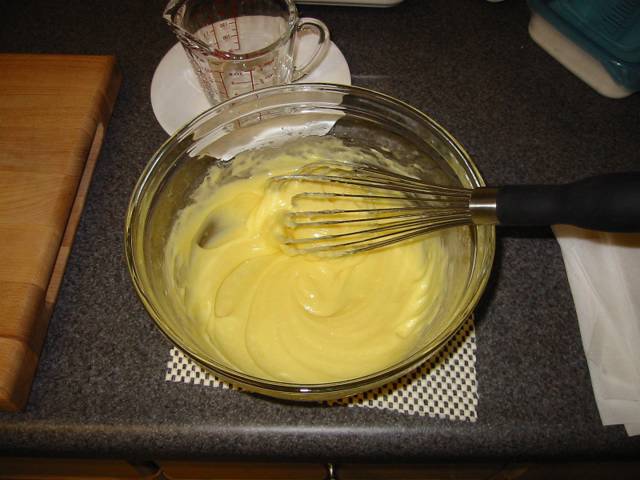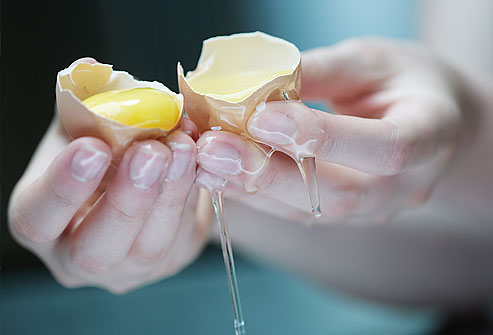Australia has an egg problem.
Health types have said as much in the past, but once again, salmonella in a raw egg dish has sickened a bunch of Australians, with restaurant owners claiming ignorance, no evaluation of whether people are doing what they say they are doing, and an opaque version of public health transparency with the consuming public.
The co-owner of the Canberra business at the center of a Salmonella outbreak says she is working with ACT (Australian Capital Territory, sorta like Washington, D.C., and home to the .jpg) federal capital, Canberra) health authorities to ensure the safety of its food.
federal capital, Canberra) health authorities to ensure the safety of its food.
It is believed raw egg in mayonnaise made at the Silo bakery in Kingston is to blame for the outbreak.
ACT Health has confirmed 13 people have been affected by Salmonella bacteria.
Five were hospitalised with dehydration after suffering severe vomiting and diarrhoea.
The bakery has been closed by health authorities until the source is confirmed.
Co-owner of Silo Leanne Gray says she is scrupulous about food hygiene and is perplexed by the outbreak.
"Until those sub-species [lab] results come back the information is not conclusive," she said.
"But I do understand the Health Department have to take actions if they have suspicions and we have nothing to hide."
"We’ve decided as of Friday, no more mayonnaise and that’s forever."
But the information about the bakery was provided by ABC News. The ACT Health Directorate would only say it is currently investigating an outbreak of Salmonella gastroenteritis linked to a Canberra food business.
ACT Chief Health Officer, Dr Paul Kelly said, “Salmonella has been identified in mayonnaise containing raw egg, with further tests of food and environmental samples pending."
Ms. Gray, the bakery owner with “scrupulous food hygiene” has apparently never heard of raw eggs as a source of salmonella – although she did point out her eggs were free-range.
Hundreds of people have been sickened in Australia in the past five years from consuming undercooked eggs or dishes containing raw eggs, including 111 sick with salmonella from home-made aioli — a garlic mayonnaise that includes raw egg – at the Burger Barn in Albury, Australia last year. Other Australian outbreaks are available at these links.
http://bites.ksu.edu/blog/139189/10/01/25/it-was-aioli-australian-salmonella-toll-albury-rises-111-linked-raw-egg
http://barfblog.foodsafety.ksu.edu/blog/137965/07/12/25/raw-eggs-sicken-50-aussies
http://barfblog.foodsafety.ksu.edu/blog/139946/08/12/29/136-hospitalized-australian-bakery-fined-40000
http://barfblog.foodsafety.ksu.edu/blog/139553/08/02/17/tasmania-rest-australia-wake-raw-egg-risks
http://barfblog.foodsafety.ksu.edu/blog/140014/09/02/08/raw-egg-hollandaise-sickens-20-upscale-retirement-home
In May 2011, the Sydney Morning Herald reported the number of Australians sickened by egg-related salmonella outbreaks rose from 96 to a staggering 753 per year between 2001 and 2008. .gif) The rate fell to 358 in 2009, but eggs are still responsible for more than a third of all foodborne outbreaks linked to salmonella in Australia.
The rate fell to 358 in 2009, but eggs are still responsible for more than a third of all foodborne outbreaks linked to salmonella in Australia.
Martyn Kirk, a senior lecturer in epidemiology at the Australian National University, said eggs had become the most common cause of food-related disease outbreaks.
Restaurants are responsible for the bulk of poisonings: 40 per cent. And while cooking will kill salmonella, restaurants are allowed to serve foods containing raw eggs.
”Most of the vehicles we see associated with outbreaks are foods where the eggs are completely uncooked; things like chocolate mousse, tiramisu, hollandaise sauce and aolis,” Mr Kirk said.
While egg producers in NSW are now required to be licensed with the NSW Food Authority, no government body conducts regular bacterial tests on eggs, or monitors the presence of salmonella on farms.
A risk assessment commissioned by the Australian Egg Corporation in 2004 found refrigerating eggs could reduce outbreaks of salmonella. The lead author of the report, the microbiologist Connor Thomas, told the Herald salmonella cannot grow in temperatures below seven degrees, and refrigeration reduces the breakdown of protective membranes inside the egg that stop the bacteria’s growth.
But in April 2011, Food Standards Australia New Zealand (FSANZ) introduced changes to the  food standards code, omitting any regulations related to temperature control.
food standards code, omitting any regulations related to temperature control.
A spokeswoman for FSANZ said it chose to exclude refrigeration requirements from the standard, in part, because of ”the substantial cost of implementing such an option.”
Ms. Gray, you can still serve mayonnaise. Use pasteurized liquid eggs, or pasteurize eggs yourself, or buy it commercially.
 affected more than a dozen people.
affected more than a dozen people.
.jpg) federal capital, Canberra) health authorities to ensure the safety of its food.
federal capital, Canberra) health authorities to ensure the safety of its food..gif) The rate fell to 358 in 2009, but eggs are still responsible for more than a third of all foodborne outbreaks linked to salmonella in Australia.
The rate fell to 358 in 2009, but eggs are still responsible for more than a third of all foodborne outbreaks linked to salmonella in Australia. food standards code, omitting any regulations related to temperature control.
food standards code, omitting any regulations related to temperature control.